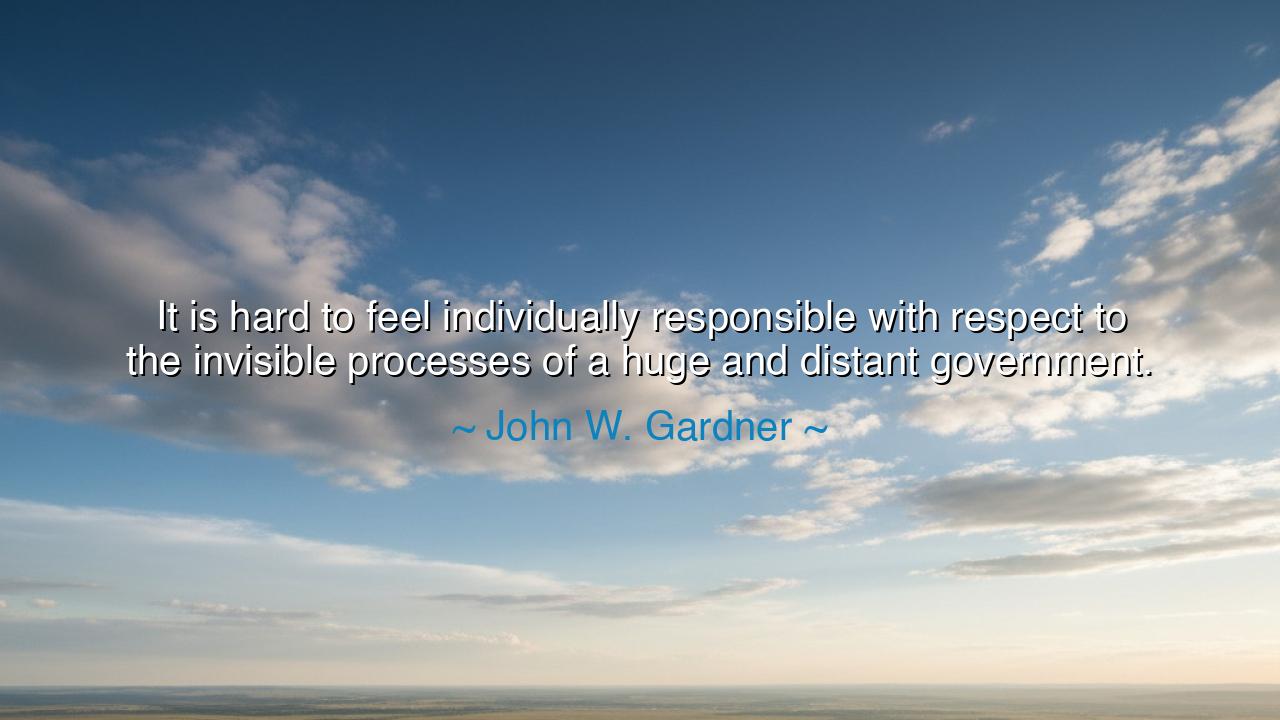
It is hard to feel individually responsible with respect to the
It is hard to feel individually responsible with respect to the invisible processes of a huge and distant government.






In the modern age of sprawling institutions and vast bureaucracies, when power stretches far beyond the reach of the individual hand, John W. Gardner, a thinker of uncommon integrity and vision, spoke these words with quiet but enduring gravity: “It is hard to feel individually responsible with respect to the invisible processes of a huge and distant government.” His voice, though calm, carried a warning — that the soul of democracy weakens not in the moment of tyranny, but in the slow decay of personal responsibility. For when people cease to believe that their actions matter, when they look upon government as an untouchable machine rather than the instrument of their will, then freedom becomes hollow, and power drifts away into shadow.
The origin of this quote lies in Gardner’s lifelong devotion to the cause of civic renewal. As Secretary of Health, Education, and Welfare under President Lyndon B. Johnson, and later as the founder of Common Cause, Gardner spent his years urging citizens to remember that democracy is not self-sustaining — it requires constant tending. He witnessed, even in his time, the growing detachment between the governed and their governors, between the individual and the immense, unseen workings of the state. His words arose from a simple truth: when government becomes too vast, complex, and impersonal, people begin to feel that their voices vanish into the void. Responsibility dissolves in anonymity. The citizen becomes a spectator rather than a steward.
In saying this, Gardner touched upon one of the oldest and most profound dangers of civilization. From the empires of antiquity to the digital nations of today, the same pattern emerges — as societies grow larger and more intricate, individuals begin to feel small and powerless. In the days of ancient Rome, when the Republic still lived, every citizen could gather in the Forum, could see the faces of the magistrates, could vote, speak, and know his impact. But as the empire expanded, and decisions came to be made by unseen hands in distant palaces, the citizen’s sense of agency faded. People began to think: What difference can one voice make? And in that quiet resignation, freedom gave way to apathy, and apathy gave rise to tyranny.
Gardner’s insight speaks to us no less today. Our governments have grown beyond the sight of ordinary eyes — their workings buried in agencies, committees, and algorithms. The processes of power have become invisible, hidden behind complexity and specialization. We no longer see the faces that decide, nor the hearts that err. And so, we grow detached, imagining ourselves as mere recipients of policy rather than creators of it. This distance, both physical and spiritual, erodes the sacred bond between the citizen and the state. When people no longer feel personally responsible for the state of their society, corruption thrives, injustice festers, and truth withers unchallenged.
Yet Gardner did not speak these words to condemn, but to awaken. His purpose was not despair, but reclamation. He believed that responsibility begins where awareness is reborn — that even within the machinery of modern life, the individual can and must find meaning and power. The invisible processes of government can be made visible again through education, vigilance, and participation. Every act of citizenship — a vote cast, a question asked, a truth defended — pulls back the veil a little more. Democracy is not sustained by the perfection of leaders, but by the persistence of citizens who refuse to be silent or detached.
Consider the example of the civil rights movement, where countless ordinary individuals — teachers, laborers, mothers, and ministers — reclaimed their sense of responsibility in the face of a system that seemed immovable. They refused to accept that justice was the domain of distant legislators alone. Through courage, organization, and sacrifice, they made the invisible visible — they forced the conscience of the nation to awaken. Their lesson is eternal: when the people act, the machinery of power must respond. When they withdraw, it rolls forward without them, crushing the very liberties it was meant to protect.
The lesson, therefore, is clear and enduring: though the government may grow vast, the heart of democracy still beats in the breast of every citizen. The sense of responsibility must not be lost to the enormity of institutions. Each person must remember that their thoughts, words, and actions ripple outward, shaping the moral climate in which power operates. To say “I cannot change anything” is to surrender before the battle even begins. But to say “I will do what I can” — that is the first act of a free man.
So, my children of tomorrow, take Gardner’s words as a torch in the darkness. Do not let the scale of the world’s problems silence you, nor the complexity of government discourage you. Learn, question, engage, and hold power to account. For though the processes of government may seem invisible, the responsibility for justice and freedom is not. It rests upon your shoulders, as it did upon those who came before. And remember always: no government, however distant, can remain just if its people cease to feel responsible for its soul.






AAdministratorAdministrator
Welcome, honored guests. Please leave a comment, we will respond soon